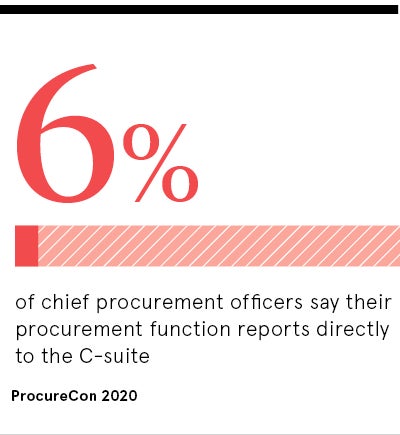A host of factors, from digitalisation to globalisation, have underscored the importance of the role of the procurement function. But damage wrought by COVID-19 serves as perhaps the most compelling evidence yet that chief procurement officers, or CPOs, must have a secure seat in the boardroom and unmitigated authority.
As the virus spreads, upending industries and roiling markets, CPOs who on a basic level are responsible for sourcing critical goods and services, face the mammoth task of creating quick turnarounds and devising alternatives to avoid bottlenecks. But their success in doing so depends on management support and the ability to act swiftly.
“The current environment has put a focus on the supply chain like never before and has exposed several vulnerabilities, a lack of visibility, flexibility and agility being the major issues that have come to the foreground,” says Dominic Regan, a senior director who specialises in supply chain management at technology giant Oracle. “Many businesses have simply found themselves unable to quickly adapt, causing a crisis in its own right.”
The supply chain is being discussed not only in the general press, but in virtual social discussions. This is new
Chris Sawchuck, global head of the procurement advisory practice at consultancy The Hackett Group, adds: “The current crisis has highlighted the significance of supply chains and supply management to our global economy.
“The supply chain is being discussed not only in the general press, but in virtual social discussions. This is new and with it, supply management is quickly evolving to a board discussion across organisations, which has elevated the importance of the procurement function. The key will be the sustainability of the recognition well beyond the current crisis.”
‘The key that unlocks critical supplies’
Lukas Pünder, co-founder of Dusseldorf-based shoemaker Cano, uses blockchain to track the journey of its products around the world from cow to customer. Although his company has invested heavily to ensure its supply chain is as resilient as possible to shocks, COVID-19 is creating challenges and is highlighting ways in which many organisations hadn’t been valuing procurement in the right way.
“It’s not so much that companies had underestimated the value of the procurement function”, he says, “but rather they’d interpreted it more as just a way of saving costs.
As for whether the role of the procurement function will change as a result of the crisis, the entrepreneur is hopeful. “Procurement will be one the most critical topics for chief executives and chief financial officers shaping post-crisis strategy and success.”
Neil Thody, managing director at Cameron Consulting, a procurement consultancy for the construction industry, agrees this could represent a watershed moment.
“Procurement, once seen as the pariah or blocker within the business, either looking to cut costs or impose unnecessary gateways, has suddenly become the key that unlocks critical supplies, goods and services,” he says.
And he hopes COVID-19 has emphasised the value of the procurement role in the boardroom. “Placing procurement at board level should offer reassurance to the chief executive and chief financial officer around wider issues associated with an organisation’s purchasing function, such as ethical procurement, avoidance of modern slavery, implementing approaches to prevent bribery and corruption, and the fact that transparent purchasing can improve an organisation’s credit rating,” says Thody.
Collaboration, agility and being human
Academics and other experts cite several practical ways in which businesses can empower the role of the procurement function to enhance supply chain resilience during the current crisis and any subsequent one. Of central importance, most agree, are strong communication and collaboration to ensure full transparency at all times.
“Knowledge from previous crises suggests that close collaboration with suppliers can provide early warnings of problems that may arise in the future,” says Dr Christos Tsinopoulos, professor in operations and project management at Durham University Business School. “For instance, if a supplier that produces a part which is critical and difficult to replicate, is facing difficulties, then taking proactive action to support them, financially or otherwise, may prove crucial.
“In such cases, procurement becomes critical as it sits at the interface between the company and its supply, and is thus well positioned to identify the problems early and help develop mitigation strategies.”
Professor Fabian Sting, chair of supply chain strategy and innovation at the University of Cologne, points to Toyota as an example of a company that has effectively empowered the procurement function to create resilience. 
“Toyota’s C-suite managers, using their experience from the devastating 2011 Japan earthquake, have mapped their supply chains and placed much attention on which suppliers deliver their critical parts, where the suppliers are located, whether there are alternative sources and how the companies can quickly ramp up alternative responsive supply chains to mitigate imminent mismatches of supply and demand,” he explains.
Role of the procurement function belongs at a senior level
It’s becoming increasingly clear, he adds, that procurement really is a key responsibility of the most senior person in an organisation.
Regan at Oracle says it has also highlighted the “need to bring back the human element to the supply chain”. He says that in recent weeks many businesses have had to find new suppliers, change the way items are produced or even produce entirely new products, such as face masks and hand sanitiser, in response to the pandemic.
“When this happens, and when the ability to forecast and predict accurately has gone out the window, what do companies do then? Of course more agility is imperative, but it also changes the relationship with suppliers. Those companies with more human or partner-type relationships may well have saved their businesses, as they were able to leverage those close relationships with their suppliers to work together and find solutions to the issues faced,” Regan concludes.
‘The key that unlocks critical supplies’
Collaboration, agility and being human


